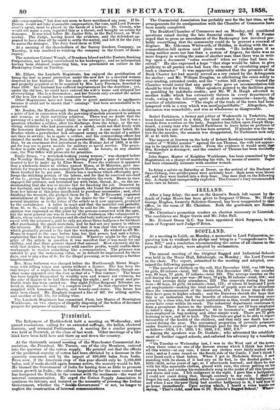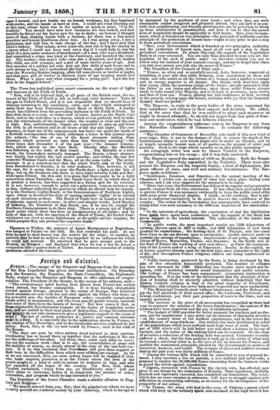SCOTLAND.
At a meeting in Leith, on Monday, a memorial to Lord Palmerston, is questing him to vindicate his pledge and bring in a "comprehensive Re- form Bill," and a resolution recommending the 11/11011 of ill Classes in-the- pursuit of that object, were adopted by acclamation.
The annual meeting of the Original Ragged and Industrial Schools was held in the Music Hall, Edinburgh, on Monday ; the Lord Provost in the chair. The report, submitted to the meeting and adopted, con- tained the following passage= " The number of children on the roll, 31st December 1856, was 100 boys, 64 girls, 83 infants—total, 247. On the 31st December 1857, the number was 89 boys, 77 girls, 77 infants—total 243. The average number on the roleduring the past year was-99 boys, 70 girls, 85 infants—total, 264; and the total average daily attendance 223. The removals during the year were-86 boys, 42 girls, 44 infants-Aotal, 172; of whom 32 boys and 7 girls got employment—making the- total number of pupils sent out to situations since the commencement of the institution, 473. No fewer than 62 chil- dren have gone to higher schools' and the Directors cherish the hope that this is an indication that the benefits of education are becoming more valued by a class who, but for such institutions as this, would most probably never have come within its reach. The industrial department continues to form a prominent feature in the institution. There are 12 boys employed in tailor's shop; 8 in shoemaker's ; 44 in boxmaker's ; and 25 younger boys employed in bag-making and other simple work. Thtere are 77 girls learning to sew, and 40 to knit. The Directors are glad to be able to report favourably of the health of the children, and that only one death has, oc- curred during the year. The centesimal proportion of juvenile prisoners under fourteen years of age in Edinburgh gaol for the four past years, was as follows-1854, 1'O; 1855, 18; 1856, 32; 1867, 2.3." Among the speakers was Dr. Guthrie ; who advocated the establish- ment of further ragged schools, and enforced his advocacy by a touching story— "On- 0n Tuesday or Wednesday last, I Was in the West end of the towu, when there came on one of the fiercest storms which I think has blown all this winter—at any rate, I 'chow my clothes were fairly soaked with rain ; and as I came round on the South side of the Castle I don't think I ever faced such a blast before. When I got to Nicholson Street, I saw standing with its shoes, if it had any on its feet, in the flooded gutter, a little child, seven years of age, as I afterwards learned; and there he was with his thin miserable clothes, glazed with rain, the storm pelting on his young head, and raising his melancholy song in the midst of all this tempest and storm and rain. I felt indignant at the sight. I gave him a halfpeanY• I could not resist doing that, though contrary to my rule. I shill not forget his red, emaciated hand, when he opened it to receive the halfpenny. and when I saw the poor thing had another halfpenny in it, I told him to go home immediately. Upon saying which, I heard a voice beside me saying, 'That's richt, send him to Dr. Guthrie's Ragged School.' Where-
upon I turned, and saw beside me an honest workman, his face begrimed with smoke, and his hands as hard as iron. I could not resist blurting out to this man, whose heart was in the matter as much as mine, 'I'm Dr. Guthrie.' You should have seen how luminous his face looked, and how heartily he thrust out his horny paw for me to shake ; an honour I thought more of than shaking hands with a duchess, for there was a fine moral grandeur and honest kindliness about him. As I was going away, I met a policeman, and told him to take charge of the boy ; and I have now that child's history. That infant, seven years old, sent out to beg for charity in a storm when I would not have sent out a dog if I could help it, was the child of a man under sentence of banishment—of a man who was a drunkard, had committed a crime, was tried at the ,Tusticiary, and banished the coun- try. The mother—this man's wife—was also a drunkard, and had, besides this child, one still younger, and a girl of some twelve years of age. And that monster of a mother not only sent out this child at such hours and in such storms to beg, but I understand ehW lied them, night after night, down near the Waverley Station begging, often till near eleven or twelve at night, and that poor girl of twelve or thirteen years of age keeping watch over them. What a place and what company for a young girl ! I got the boy sent to the Ragged School."
The Times has published some smart comments on the want of lights and beacons in the Firth of Forth.
"Now, will it be believed that, of all parts of the British coast, the en-
trance of Firth of Forth is left in well-nigh total darkness? Turn off the gas in Oxford Street, and it is not impossible that we should hear of mishaps occurring to the omnibuses, carts, and cabs,twhich attempted to make their way from Tottenham Court Road to Hyde Park. A similar result has followed from the prevailing darkness in the Firth of Forth. In that firth there is a rock, or rather reef of rocks, known as the North Carr Rock, and on the rock there is a beacon, which serves perfectly well to indi- cate the whereabouts of the danger when the weather is clear and the sun is high. But, unfortunately, vessels are compelled to pass up and down the firth in all weathers and at all hours of the day and night. The con- sequence at least one of the consequences, has been—we quote the words of a Scottiali correspondent who lately addressed a letter to this journal upon the subject—' the loss of one of the finest steamers sailing from Granton, which occurred no later than last Saturday morning '—the letter bears date December 3 of the past year—' the steamer Commo- dore, which struck on the Carr Rock. Shortly after, the Martell° was following in the wake of that vessel ..... The lifaitello is a total wreck, the Commodore seriously damaged. The Queen, a large steamer, was totally lost within the last twelve months ; and within the last few years the Windsor Castle and the Mars, all on the same rocks.' The writer assumes it as a notorious fact that the whole North side of the Forth, from Burntisland to Dundee, is in total darkness. This, however, is not the case for it seems there is near the North shore a light on the Isle of May, but on the Southern side there is not a light between Leith and Ber- wick-upon-Tweed. On this side it is plain that there ought to be a light somewhere about Tantallon; and the -South Carrs Reef, on which there is at present a beacon, has been suggested as a fitting spot for its erection. It is not,. however, enough to point out a grievance, even so serious a one as this, without indicating the quarter to which we should look for remedy. It is the Northern Lights Board, or the Commissioners of Northern Lights, upon whom is devolved the duty of causing suitable 'lights' to be erected on such situations as these. The Board of Trade here in London is a board orultimate appeal in such cases ; in other and simpler words, Lord Stanley of Alderley, the President of that Board, can, if he secs fit, compel the Northern Commissioners to do their duty. There is a recent act of Parlia- ment under which there has been an amalgamation of all lights ; and by help of this act, with the sanction of the Board of Trade, the Scotch Com- missioners can erect as many lighthouses as the public service requires, for which purpose they can procure the requisite funds."
Thomson or Walker, the poisoner of Agnes Montgomery at Eaglesham, was hanged at Paisley on the 14th. He had confessed his guilt. At one time he said to steal money was the motive for the crime ; at another, he asserted Spit he had no motive—he was impelled by an influence for which he coo14 aceOunt. He admitted that he gave prussic acid to the Masons04:ellasgow ; and disclosed that when he was a boy he forced a companiowinto a quarry-hole at Tarbet. An immense concourse of orderly spectators attended the execution.



































 Previous page
Previous page